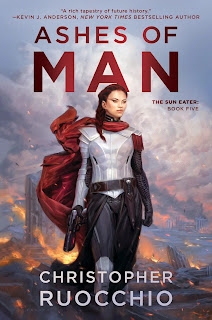Ashes of Man review; heartbreaking, but hopeful
I had wanted to get the reviews for Ashes of Man's predecessors done before I got to this one, but my gratefulness for Netgalley's ARC supersedes this. Thank you Netgalley!
This review will be spoiler-free, but vague references to the nature of previous events in previous books will be made.
Ashes of Man is book 5 of the Sun Eater series, but it originally was to be book 4. Publishers were forced to split the book apart, as there was a paper shortage at the time. Do not let this worry you; both Kingdoms of Death (book 4) and Ashes of Man are made better by this split. Why? I'll answer this question as I go along this review.
The series so far has put Hadrian Marlowe through the COMPLETE ringer, which is made especially clear in Kingdoms of Death. Ruocchio does not hold back one bit when it comes to this. It would be no surprise then, to hear that the years are taking their toll on Hadrian Marlowe, both on his physical body and his mental state. Hadrian Marlowe is a broken man and you can see just how tired he really is. His exhaustion, burnout, and trauma are handled very well, being made prominent everywhere throughout the narrative. You can see it in the writing of the subtle, reluctant movement of limbs, and you also can see it in Hadrian's thoughts. But he has no choice. He has to keep going, he has to keep fulfilling his duties.
Hadrian is a great character. In this book, side characters are given their chances to shine on their own. Sun Eater is written in first person retrospective, a narrative style that can often be way too protagonist-centric. With that in mind, giving side characters the personality, agency, and heroism they possess here grounds the story, showing us that not everything and everyone in this world revolves around Hadrian Marlowe as its center. Side characters in Sun Eater have always been great, but in this book, I think they truly become characters.
Ashes of Man's pacing in the first half is deliberately made slow so that Hadrian has the time to recover from his aforementioned issues, and from the events of Kingdoms of Death. The pacing also allows the narrative to show you how the legend surrounding Hadrian Marlowe has changed and etched itself over the centuries, and to see the consequences of his actions. There's no attempt to rush him back into the action, which I greatly appreciate; oftentimes, authors simply rush their characters back into the plot after traumatic events and ignore any lingering damage in the process. Ashes of Man is not a victim of this. Things do speed up in the second half, and Sun Eater's epic space fantasy side bears its head again; the plot is shaken up with insane reveals and chaotic action. It all culminates in a sequence of events and consequences that forced such a visceral emotional response out of me; I am glad I did not get a physical copy of this book, as it would have been ruined by tears.
If I had to summarize the themes of this book, I would simply use this quote :
"The ugliness of the world does not fade, nor are fear and grief made less by time, nor is any suffering forgotten.
We are only made stronger by its blows."
You might think that this is reductive of everything the book explores. I personally find it empowering and encouraging. Ashes of Man explores grief, loss, trauma, and while it does not deny their existence, it nonetheless inspires you to keep going, because there is a light out there to be found, lights you still have not seen. I read this book in a dark place, and these themes just hit and resonated with me so much more because I really needed it during this time. Ruocchio's special prose writing just makes his themes and everything else stated here so much better, in how it lends beauty to his world, provokes your mind into riding trains of thought, and rushes you through the action.
If Ashes of Man and Kingdoms of Death had remained merged, they would not be given the space they need and deserve. Splitting them up was the best decision for the series, as the emotional toll of both books combined would have been heavy beyond appreciation and enjoyment. Do not worry about the narrative being halved here, I can assure you that it is not the case here. Kingdoms of Death is its own book, and Ashes of Man is its own book as well.
To conclude, Ashes of Man is a tale that embraces the reality of suffering while inspiring hope, and it is one that is written excellently. This is the first ARC that I have ever received, which makes this a reading experience I will forever cherish and hold close to my heart. Thank you again, Netgalley for this opportunity, and may my review give this book and the series it is part of the attention they deserve.
Score : 10/10
More Sun Eater reviews will be coming soon. Ruocchio is grossly underrated as a writer and I am going to do my best to shine a light on his work.


Comments
Post a Comment